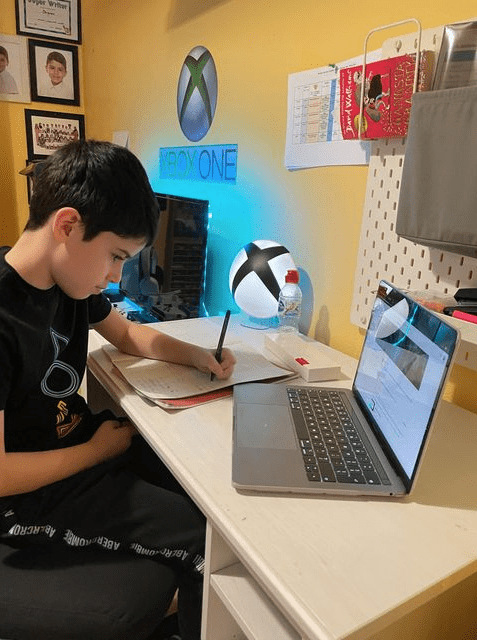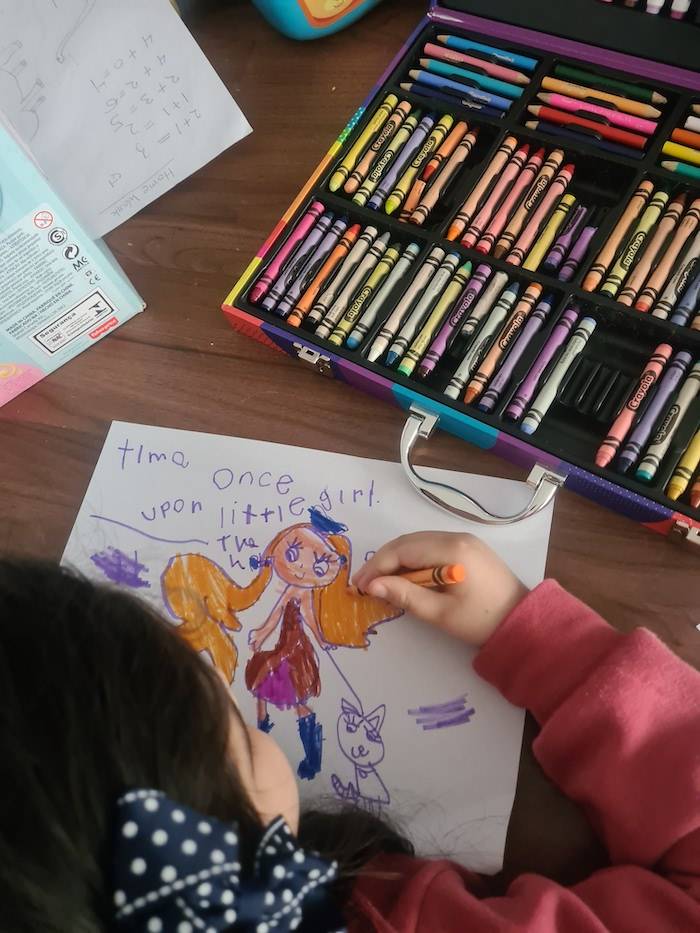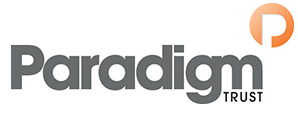Learning Through Lockdown

Clever planning, a robust pedagogy and innovative teaching methods have helped Paradigm Trust continue to provide effective education for its students during the third national Covid lockdown.
Using findings and insights from the first period of lockdown in the spring and summer term of last year, Paradigm Trust built a robust plan of action should the need to close schools and engage in remote learning arise again, for whatever reason. Preparation continued through the autumn term when schools were fully open, including training staff and pupils on how to use Google Classroom, discussing a remote learning pedagogy and planning the logistics that were necessary to be able to deliver effective teaching online to all its pupils.
So when, with barely twelve hours’ notice, the official notification that schools would be closed to all children (apart from vulnerable and key worker children) was received, Paradigm Trust were able to move swiftly to remote learning with a minimum of disruption. Thanks to the preparation made earlier, schools are now delivering a full and engaging timetable which mainly comprises either recorded lessons made by Paradigm teachers, or live lessons which follow the same structure as an in-school lesson.

One of the most significant challenges faced in the first lockdown was the ‘digital divide’, with many families unable to access the online resources available due to a lack of appropriate devices and/or a reliable internet connection with sufficient data allowance. With live lessons now an established feature at all levels of schooling it is even more important that every student has an acceptable level of access to the internet, one which permits them to participate fully in online learning.
To this end Paradigm schools have supplied more than 1900 Chromebooks to families who were having difficulties accessing remote learning online. To put that in context, the Trust educates just under 3200 pupils, with around 40% of those pupils eligible for free school meals. To help meet the challenge of unreliable or insufficient internet access the schools have also been distributing dongles preloaded with data allowance, and arranging for families to have their data cap increased by their internet provider, to ensure all pupils are able to access the same resources.
Remote learning also presents a challenge when it comes to providing pastoral support for staff and students. Indeed, being in a third lockdown is likely to exacerbate the need for support, with issues such as mental health problems becoming more prevalent, and the usual provision and support provided in schools being inaccessible in the usual places and formats.
Paradigm Trust recognises this is a serious issue and so to ensure schools can support its students effectively Paradigm has put a number of different measures in place and is regularly reviewing them to find ways in which they can be improved. It is still running interventions, though in the virtual environment rather than face to face. Specialised support staff are joining in the lessons to provide additional support to the pupils who need it, and hard-copy packs of the learning as well as practical resources to support the online curriculum are being offered. Paradigm’s inclusion teams continue to work and there is regular contact with vulnerable families. Counselling services continue to operate remotely. Where appropriate students receive welfare calls during the week to check how they are coping with school work and life in general, and provide support where necessary, and all schools are offering the voucher scheme to those families who are eligible for free meals. As it would be in normal times, all the support Paradigm provides is individualised to the needs of the pupils.
The way in which Paradigm Trust schools support their SEN pupils has also had to be adapted to work in the new circumstances. This has manifested in a variety of ways depending on the school and the requirements of the pupil. Teachers are differentiating the work on Google Classroom to meet the needs of the students, and one-to-one lessons are taking place, as are interventions and speech and language therapy sessions. We encourage vulnerable pupils to attend school on site, including all pupils with an education, health and care plan. The approach is proving effective, for example the children in the SEN unit at Murrayfield Primary Academy are flourishing, with pupils making consistently good progress despite the circumstances.
As a Trust, Paradigm has been able to use its collective resources to benefit every one of its schools. To ensure pupils have access to as broad a curriculum as possible, Paradigm Trust Pedagogy lead Ben Rogers and leaders at Ipswich Academy have mobilised the curriculum leads across all six of the schools to create bespoke, pre-recorded content across a range of primary subjects including Science, Geography, Computing, Art and Design, DT and PE.

By collaborating in this way Paradigm can ensure schools continue to deliver excellent teaching and also reduce workload on teaching staff at this high-pressure time. Staffing can be managed more efficiently and physical resources such as art equipment sets can be provided for pupils to use at home.
Paradigm Trust’s commitment to continually improving its educational offer has withstood, and even been strengthened, by the pandemic. It continues to seek the most effective ways to teach remotely, testing different innovations and then sharing those that have been proven to be effective. Opportunities to share teaching practice have been created across the Trust, so that staff can reflect on colleagues’ approaches and incorporate aspects into their own work. Everyone at Paradigm works together to deliver an effective, challenging and interesting remote learning experience for its pupils.
Breaking the ‘Digital Divide’ at Murrayfield Primary
Murrayfield Primary Academy have been featured in the Ipswich Star following their efforts to break the ‘Digital Divide’ and allow as many pupils as possible to access distance learning resources. Read the full story here.
How a shared pedagogy improves education

Paradigm Trust has achieved improved outcomes as a result of establishing consistent pedagogical approaches across all six of its schools just over four years ago.
By implementing a shared pedagogy it’s seen a culture shift both in the classroom and in the curriculum, with improvements across the board in behaviour and engagement. Outcomes in lessons are much better and it is now seeing a consistently higher level of effort in all classes.
The Trust defines its pedagogy as taking the most direct route to learners knowing more and being able to do more. It’s about how you know what to teach, how you teach it, how you know what has been learnt and, perhaps most importantly, what you do if learning hasn’t happened.
With children only having a finite number of hours in school, the time we have to educate them is limited. This is why it is absolutely crucial to optimise what they get out of those hours, using every second as efficiently as possible to ensure pupils are achieving the maximum learning. Inefficiencies in teaching methods and curriculum waste this important time, so having an effective, well thought out and proven pedagogy is essential. If we teach efficiently, at the end of a child’s school career s/he will be well prepared to flourish and lead a positive, fulfilling life.
Paradigm’s pedagogical foundation for many years has been Teach Like a Champion – a collection of techniques which combine to deliver incredibly effective learning. Over the last three years this has been strengthened through the use of Rosenshine’s Principles of Instruction, which establishes ten different strategies for teaching and assessing. Unlike many of his contemporaries, Rosenshine’s work is evidence-based, so Paradigm Trust knows for certain these methods are effective. The two works complement each other, providing a well-rounded base on which to build our pedagogy.
By using the same pedagogy across all six schools in the Trust we can achieve a continuity of practice which is of great benefit to both pupils and staff. It means that there is a consistency in the way we teach, in the way we behave, and in the way we apply our rules that runs from Early Years right through to Key Stage Four in every school. A Year Six teacher in one school is able to move to a Year Two class in another school and fit in seamlessly because s/he will recognise the strategies being employed and the language that is used. When children move from one Paradigm school to another, they already know the routine and the way things work, allowing them to settle more quickly and resume effective learning sooner.
This consistency also makes staff training and development easier, as staff can easily see effective examples of our pedagogy in action in colleagues’ classrooms. This then facilitates powerful coaching sessions which are underpinned by common language and approaches.
While consistency is important (for the reasons outlined above and because it makes logical sense for evidence-informed practice to be rolled out to benefit all pupils), slavishly following a set of strict guidelines to the letter can be counter-productive. We encourage all our staff to adapt, intelligently and with a strong understanding of the underlying rationale, Paradigm’s pedagogical approaches to fit the needs of their pupils and subjects. Every class, every child, every school is different, and our pedagogy is designed to be flexible, giving teachers the tools to work in each individual situation.
Having this shared set of strategies naturally leads to improvement. With everybody in our six schools working with them, it makes it easy for us to get together and share strong practice. When one teacher makes a small adaptation which proves to be successful, this can then be disseminated and implemented across classes and schools. Paradigm’s pedagogy creates a virtuous circle based on three linked elements: curriculum, teaching and assessment. We identify what is important for pupils to know and be able to do; we teach that knowledge and skills efficiently, and we then assess what has been learnt, which in turn feeds back into our curriculum design to close the loop.
Paradigm’s approach to identifying and scaling up effective practice is one of its key strengths. We recognise, however, that making changes to practice, in any organisation, can be uncomfortable – particularly where those changes involve replicating practice from one part of an organisation to another. In Paradigm, those barriers to acceptance are mitigated as the pedagogy is based on an external proven source. The Trust takes a collegiate approach, with its leadership being both democratic and inclusive – which means that staff are willing to listen and try new ideas based on clear communication around the rationale for change, as well as being encouraged to make their own recommendations. This encourages continuous improvement – everyone in the Trust benefits.
Since employing its current pedagogy, the Trust can clearly demonstrate that pupils are learning more, with reference to both internal and public data. Discussions with pupils and the work in their exercise books provides evidence that effective learning is taking place. A recent Ofsted report for Murrayfield Primary Academy gave an external evaluation of our pedagogy and curriculum, noting: “For each subject there is a well-planned curriculum across the MAT from Year 1 to Year 9, ensuring that pupils are prepared well for secondary school. There is a real partnership between primary and secondary teachers developing their subject expertise.”
Paradigm’s pedagogy will continue to evolve, and thereby improve the outcomes of children in its current schools, with other schools that it supports, and with schools which join the Trust in the future.
